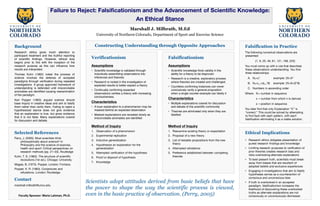
Milbrath (2016) Falsificationism & Ethics (Poster)
- 1. Selected References Parry, J. (2005). Must scientists think philosophically about science? In Philosophy and the science of exercise, health and sport: Critical perspectives on research methods (pp. 21–33). Routledge Kuhn, T. S. (1962). The structure of scientific revolutions (1st ed.). Chicago: University Magee, B. (1973). Popper. London: Fontana. Popper, K. R. (1963). Conjectures and refutations. London: Routledge. Contact marshall.milbrath@unco.edu Faculty Sponsor: Maria Lahman, Ph.D. Background Research ethics gives much attention to participant treatment and the truthful reporting of scientific findings. However, ethical duty begins prior to this with the inception of the research purpose as this can influence how results are interpreted. Thomas Kuhn (1962) noted the process of science involves the defense of accepted paradigms through verification during repeated investigations. A group approved framework of understanding is defended until irreconcilable anomalies are identified causing reexamination of the paradigm. Karl Popper (1963) argued science should base inquiry in creative ideas and aim to falsify them rather than verify them. Failing to reject a hypothesized stance does not give evidence that an explanation is true, but gives evidence that it is not false. Many explanations coexist for discussion and debate. Falsificationism Assumptions • Scientific knowledge finds validity in the ability for a theory to be disproven • Research is a creative, exploratory process where theories are created and challenged. • Countless confirming instances can never conclusively verify a general proposition when a single counter-example can falsify it Characteristics • Multiple explanations coexist for discussion and debate of the scientific community • Theories are eliminated only when they are falsified Method of Inquiry 1. Reexamine existing theory or expectation 2. Proposal of a new theory 3. List of testable propositions from the new theory 4. Attempted refutations 5. Preference established between competing theories Ethical Implications • Research ethics obligates presentation of purest research findings and knowledge • Limiting research purposes to verification of prior theories creates research bias and risks overlooking alternate explanations • To best present truth, scientists must break away from biases that are resultant of adopted beliefs and exclusive experiences • Engaging in investigations that aim to falsify hypotheses serves as a counteraction of conscious and unconscious bias • If truth is overlooked in an accepted paradigm, falsificationism increases the likelihood of discovering these overlooked truths as alternate explanations are not consciously or unconsciously dismissed. Falsification in Practice The following numerical observations are presented: {1, 9, 25, 49, 81, 121, 169, 225} You must come up with a rule that describes these observations understanding. You find three relationships: A. Ni=xi 2 example: 25=52 B. Ni=xi-1+(si-1*8) example: 25=9+(2*8) C. Numbers in ascending order Where: N= number in sequence x = number from which n is derived s = position in sequence You later find that only Explanation “C” is “correct.” This could be solved by attempting to find fault with each pattern, with each falsification eliminating it as a viable solution. Marshall J. Milbrath, M.Ed University of Northern Colorado, Department of Sport and Exercise Science Failure to Reject: Falsificationism and the Advancement of Scientific Knowledge: An Ethical Stance Verificationism Assumptions • Scientific knowledge is validated through inductively assembling observations into inferences and theories • Research is rooted in the investigation of expected results to better explain a theory • Continually confirming expected observations verifies a theory with increasing conclusiveness. Characteristics • A truer explanation to a phenomenon may be masked behind an expected observation • Masked explanations are revealed slowly as irreconcilable anomalies are identified Method of Inquiry 1. Observation of a phenomenon 2. Experimental replication 3. Inductive generalization 4. Hypothesize an explanation for the generalization 5. Attempted verification of the hypothesis 6. Proof or disproof of hypothesis 7. Knowledge Constructing Understanding through Opposite Approaches Scientists adopt attitudes derived from basic beliefs that have the power to shape the way the scientific process is viewed, even in the basic practice of observation. (Perry, 2005)